by Jenny Rose | Jun 8, 2024 | Connection & Community, Emotional Intelligence
My work team and I are always on the lookout for new ways to work with our pool patrons. We look for new moves and songs for water exercise classes and new ideas for working with swim lesson kids. 
A few weeks ago, a team member remembered an old book she’d seen titled The New Games Book. She remembered it as a resource for non-competitive games focused on play and teamwork rather than winning and losing, and we wondered if we could adapt some of the games to the water. I was interested, as I’m notoriously noncompetitive, to the point where a competition of any kind feels traumatic. Fortunately, we have a local librarian as a pool patron; she found a copy of the book. The copyright is 1976. The Dark Ages.
It is indeed filled with a variety of games, as well as black-and-white photos of people playing.
People playing. People in parks and other common outdoor areas, people of all ages, laughing, smiling, playing, and … touching. Dogs, too. It was like looking at a different world. I paged through the book, marveling, feeling sad about how much we seem to have lost. In the end, we concluded we couldn’t adapt any of the games to the water because they all involve touching.
We can’t adapt noncompetitive, team and community-building games for kids from this book because they all involve touching. It seems unbelievable.
I don’t blame the pandemic. It didn’t help matters, for sure, but social physical contact began to diminish before that. We’ve been gradually turning away from each other to look at screens for decades now, and as that’s happened social touch has become vilified.
When was the last time you went to the park to walk your dog (or just yourself), maybe with your kid(s), your mate, or a friend, met other people from your neighborhood there, and you all (dogs, too) played a silly game, or even something like frisbee?

Photo by Helena Lopes on Unsplash
Yeah. Me, too.
People play video games online together. My sons do that, one in Colorado and one in Montana. They’ve been doing it for years, even when they both lived in Colorado and could have gone to the park together.
Culturally speaking, we’ve never dealt well with touch. How could we in the context of patriarchy and rape culture? I’ve been raped, and I’ve been hit. I knew it wasn’t okay for a man to hit me, but at least it was some kind of touch. Believe me, I know how terrible that sounds, but I have always been so skin hungry because of infancy and childhood touch deprivation, even getting hit was better than no touch at all. It made me feel real. Blood and bruising are real. It made me feel alive – for a moment.
Can any of us be fully healthy without appropriate social touch? I know I can’t.
I have several friends who are uncomfortable with touch. Two were raised in the Catholic church, a fine patriarchal and shame-based system. One was sexually abused as a child.
Social touch is so complicated. How do we mandate appropriate touch? What do we do with adults who believe nonconsensual sexual contact with children is healthy and natural? How do we address boundaries, self-respect, sexuality, and family planning? What do we do about rape? How do we protect children whose parents believe physical abuse is the best way to discipline them? How do we know when it’s safe to touch someone and when it’s not? How do we incorporate the idea of consent back into our lives?
Now AI looms over us. Every day I read predictions about its influence, about those who are experimenting with it. I hear from people who predict AI is the end of all creative culture and people who believe it will support and nourish creativity.
One thing I know: No technological immersive experience, no matter how well crafted or engineered, can replace living, breathing physical interaction. Physical intimacy (not just talking about sex) is sensual – it involves all our senses, including the marvelous, taken-for-granted organ we call our skin. Human physicality is not a sterile algorithm. It’s not a porn film. It’s not filtered, airbrushed, photoshopped. A human being is a mass of contradictions, of scents, sounds, and textures. We’re unpredictable. We’re illogical. We’re beautiful and hideous, sacred and profane. Interacting in healthy, useful ways with other humans is challenging, offensive, and often dangerous. Also hilarious, fascinating and, increasingly, necessary if we want to survive. Human relationships are not fairytales, rom coms, TikTok videos, or roleplaying games.

Photo by Liane Metzler on Unsplash
I don’t believe we can make a substitute for human touch. Our bodies and perhaps our souls cannot thrive without it. Yet we are steadily eroding our ability to exchange or even recognize healthy touch, to the extent that the documented behavior of one of our most powerful political influencers is a clear demonstration of rape culture in action, and his followers, many in the top tiers of power, either don’t care or actively support his misogyny.
Touch, like climate, like food, like political systems, is unbelievably complex. At the same time, we must have a planet that supports our physical needs, we must eat to live, and unless we’re the last person on the planet we must figure out how to make decisions with others. If we don’t do those things, our species will die. Life and death as a binary are not complex at all.
If we lose touch, how much meaning, pleasure, and health will we lose from our lives? As our ability and willingness to exchange appropriate touch diminishes, are we healthier and better connected or increasingly divided and unhealthy? Note the present mental health crisis among young people. Most agree enforced isolation during the pandemic did not support our social needs, especially the health and development of children. At the same time, we deliberately and cheerfully offer ourselves every day to technology that actively and purposefully isolates us from living, breathing, face-to-face interaction with the physical world and other people without even noticing.
When I try to imagine a world without the feel of my cats, the earth and plants outside my window, supple bread dough rising in its greased bowl, the laptop keys under my fingers, a cup of hot tea between my hands, cool water against my body as I swim, the energetic little bodies of children I teach to swim, and all the other countless things I touch each day, I can’t. I don’t want to. My brain might be fooled by an immersive AI experience, but it’s hard to believe my body could ever be nourished and satisfied by one.
As I was thinking about this post, I came across an essay from a poet I follow on Substack, Anagha Smrithi, titled “In the Age of AI, Poetry Matters More Than Ever.” In it, she wrote:
“Our hands need something to hold onto. Our fingers need something to touch.”
I’m glad it’s not just me who values touch.
Questions:
- How do you feel overall about human touch?
- Who in your life are you able to exchange healthy touch with?
- Do you prefer your social life to be online or in person?
- What’s a favorite tactile sensation or texture?
Leave a comment below!
To read my fiction, serially published free every week, go here: 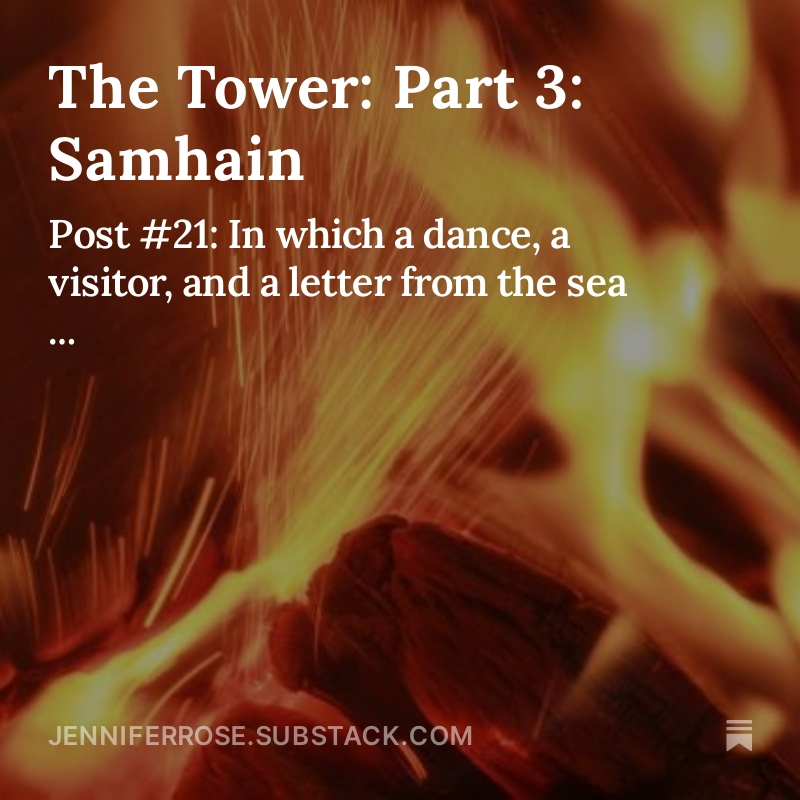
by Jenny Rose | Nov 22, 2018 | Aging, Connection & Community, Emotional Intelligence
At 6:30 a.m. on Monday morning, we park in the dark, empty parking lot and use a combination keypad to enter the building and a key to unlock the door to the pool, re-locking it behind us. We turn on lights, computers and automatic doors. We run a shower in the men’s and women’s locker rooms, as the hot water takes several minutes to reach them and the early swimmers complain of cold showers. We check the temperatures and chemicals in the pools. We peel off our winter layers and put on suits, shorts, emergency fanny packs and whistles. We check the day’s schedule. All the while, a rising chorus of voices and laughter comes from outside the still-locked door where the early water aerobics class gathers, as though it’s noon and not O-dark-thirty on a cold November morning. The aerobics teacher gets her music ready and checks the wireless headset. This class is large, so she will teach from the pool deck rather than the water.
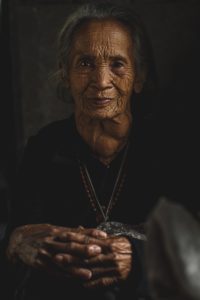
Photo by ivan Torres on Unsplash
At 7:00 we unlock the door and they stream in, laughing and talking, tousled heads of grey, white and improbable shades of blonde and brown. Not one of them is under 55. This morning the entire class consists of women. They disappear into the locker room, where the mirth and talk continue as they change and shower. I gather up a rescue tube and get comfortable in the lifeguard chair.
Descending the steps into the pool, the women tease one another and complain about the cold water. Many wear glasses, though they’ve removed their hearing aids. Many wear earrings. A couple of them dispense kickboards, foam buoys and floating foam noodles from plastic laundry baskets on shelves at poolside.
On this morning I count 17 in the class. We know one of them had a birthday over the weekend. The instructor gives her a blue plastic tiara and matching wand from the Dollar Store while we all sing “Happy Birthday.” She’s informed the tiara must stay on her head during the class. She presses it firmly onto her grey hair, laughing.
The instructor cues the music. I jiggle the dial on the wireless speaker, which never seems to work properly, and the class begins with the announcement of a Beatles soundtrack. “Hard Day’s Night” starts the warm-up to a 45-minute water aerobics workout.

Photo by Cristian Newman on Unsplash
Music is so evocative. I can’t hear The Beatles without thinking of my brother, who owned and played all their albums when we were growing up. These women are a decade older than I am, and they greet each song with delight. They know every word. They bob up and down, kicking, twisting, using the kickboards and buoys for resistance and strengthening in the water. Most are generous-bodied and their bosoms bounce within the confines of their modestly cut suits. I see lime green, pink and black. I see loosened skin and wrinkled cleavage, pink scalp and cellulite while “Revolution” fills the brightly lit, echoing space.
The instructor guides the class from one set of movements to another. They stand in place. They travel back and forth across the pool. They lift, bend and stretch in a circle. We all sing together. They inform each other, soulfully, “I want to hold your hand.” The water churns with their efforts. “Got to get you into my life!” they shout at one another with hilarious passion.
As I watch, I try to imagine these well-ripened, glorious women as teenagers. I imagine them hearing “Good Day Sunshine” for the first time on radios, records and jukeboxes in diners, in cars and at parties. They were all young once, pretty, idealistic and probably as foolish as most young women are. They had homework and crushes on teachers. They had families and friends and gossiped. The Beatles were part of the soundtrack of their lives. Now, decades later, what old memories, thoughts and feelings do these familiar songs unlock? What stories do they recall, what pleasures, what griefs and disappointments when they hear “All My Loving?”
The very last song is “Yellow Submarine.” By now even I am breathless with laughter. Impossible to hear this music without moving to it, even if confined in a sitting position. The instructor is incapable with mirth. It doesn’t matter. The class guides itself, arms high in the air over their heads, red-faced, panting, dancing in the water. They turn, bump ample hips with one another, gesture flamboyantly, and we all sing at the top of our voices until the music stops and the class ends.
Knowing the routine, the class puts all the equipment away tidily in the sudden quiet. They pull the lane lines back into place and hook them up. They exit the lap pool and move to the 93-degree therapy pool, where they break into groups and chat, some in the shallow end and others floating peacefully in the deep end. The birthday girl is still wearing her blue plastic tiara. Now the talk is more subdued than it was before the class. I hear a discussion about snow shovels, snow blowers, and the performance of various men, hired and otherwise, with these tools. I hear talk of families, grandchildren and plans for the holidays. A group in a corner carries on a low-voiced discussion interspersed with much bawdy laughter. It’s not hard to imagine what they’re talking about. I smile in sympathy. Local news and politics are dealt with, along with the weather, the state of the roads, church gossip, local holiday activities and fund raisers.
It’s just 8:00 on a Monday morning. These women represent part of the backbone of the community. Seasoned, experienced, humorous and wise in the ways of the world, they know exactly who they are and what they’re made of. They’ve loved and lost, worked, raised families, volunteered, suffered grief, illness and injury. They’re outspoken, earthy and unapologetic. They know how to connect with others. They know how to play and laugh. They are kind and compassionate without being sentimental. They know how to love life.
Monday morning we all lived in a yellow submarine for an hour, and proclaimed it joyfully at the top of our voices.
I wish you all abundance this Thanksgiving.

Photo by Joanna Kosinska on Unsplash
All content on this site ©2018
Jennifer Rose
except where otherwise noted
by Jenny Rose | Jun 14, 2018 | Connection & Community, Emotional Intelligence
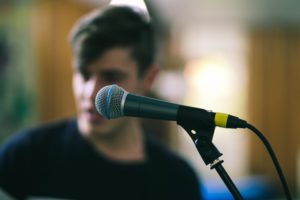
Photo by James Coleman on Unsplash
Saturday night I attended a monthly open mic event called The Coffeehouse. It took place in the basement of a local church, which is also where our Tai Chi group meets. People came from far and wide to participate. I was there to tell stories for the first time since I came to Maine.
My partner came with me, and I knew two other people there from Tai Chi. Otherwise, everyone was a stranger. I sat quietly in a corner and watched the place gradually fill up. I could see many of these folks were old friends. In fact, during the course of the evening I learned that The Coffeehouse has been happening for more than 20 years in that very basement, hosted by the same man since the beginning. I heard stories, both on mic and off, of cancer, divorces, moves, jobs, remarriage and grandchildren.
Cases were opened and out came guitars of every description. Musicians sat together, teaching one another chords and fingering, and playing together. Ragged sheet music, song lyrics and notes lay on every table. In front of the mic, I heard about being a cafe musician, playing music for weddings, and stories from a couple who composes, writes and performs music together, splitting their time between Arizona and Maine.
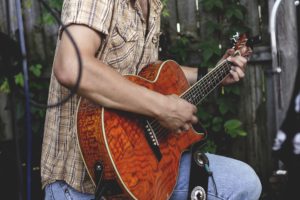
Photo by Brandon Wilson on Unsplash
One man stood up and read a short story he’d written. Another gave a hilarious rendition of a Shel Silverstein poem I used to read aloud myself as an elementary school librarian. Yet another read one of his own poems in between playing his guitar. A woman performed on her autoharp.
Many of the performers expressed nervousness, but each was volubly supported by the audience. Jokes were cracked, stories exchanged. Everyone was applauded warmly, including me.
When it was my turn, I stood before them, my heart throbbing uncomfortably in my chest, looking out at a roomful of faces I’d never seen before. I introduced myself briefly and told a short peace tale from China, followed by a longer story from Jane Yolen. The audience was generous, attentive. The poignant memory of other, more familiar audiences in my old place caught at my throat. As I wove the stories, I looked from face to face, speaking directly to each one as though we were alone. Their expressions softened as they entered into the stories with me, seeing what I was seeing and feeling what I was feeling. I know my own face wore exactly that expression as I listened to their music and songs.
Each performer took his or her fifteen minutes or so to share their art. It was a long night. In fact, it started about the same time I like to be heading for bed. Yet that evening fed something in me that’s been starving for three years. I had a strange sense of coming home, of belonging and kinship.

Photo by Andrew Loke on Unsplash
My partner and I talk a lot about community, how essential it is, how to create it, how to join it and how to support it. I believe, as humans, we must find some kind of community to meet our connection needs if we want to live well. We’re social animals, and I think we’re beginning to see the high cost of isolation and disconnection play out in suicide rates, violence and addiction.
The Coffeehouse clarified for me an aspect of community I haven’t really discerned before. Right now, the world is chaotic and increasingly complex. We’re faced with serious issues and changes we’re ill-equipped to deal with. I’ve been thinking about the local food movement, grassroots politics, permaculture, and alternative energy and housing through the lens of community. All of those issues are vitally important, and becoming more so by the day, but I’ve been skipping over the most important thing community can give us, the aspect that must be present, supported and nurtured before any kind of problem solving or effective organization can happen.
The Coffeehouse is, essentially, an adult playgroup. I heard nothing about diet, gun control, immigration, politics or climate change. I heard nothing about social justice or gender politics. We all shared the same bathroom, the same coffee and snacks. We all put a voluntary donation in the basket. Instruments were shared. We shared time, microphones, personal stories and creativity. There was no talk of cultural appropriation.
We laughed together.
We played together.
We were kind and generous with each other.
We took turns.
As I sat there watching it unfold, it occurred to me to wonder how we’re ever going to manage to address all the pressing problems in the world today if we can’t come together as human beings and play with one another first. How do we find our way to collaboration and cooperation unless we build trust and respect and are able to just have fun together? The Coffeehouse showed me humans at their best. Heck, I was at my best. In such a warm and supportive atmosphere, my social anxiety was not disabling. People talked to me, welcomed me, expressed appreciation for the stories and received my appreciation for their contribution in return. I recognized several who performed were more nervous than I was. None of us were hiding behind technological screens. There was no escaping a forgotten lyric, the wrong chord or symptoms of performance anxiety. One of the musicians talked ruefully about a new tremor in his hands that impeded his playing. We could all see it. He played anyway.
In the days since The Coffeehouse, I know I’ve found something I’ve been looking for since I came to Maine. I thought I just wanted a place to share stories again, and I do, but this gathering is about something much bigger than that. This is about mutual authenticity, creativity, contribution and play. It’s about friends. It’s about celebration and connection in the midst of a dark and stormy time.
I can hardly wait for the next one.

Photo by rawpixel.com on Unsplash
All content on this site ©2018
Jennifer Rose
except where otherwise noted
by Jenny Rose | May 11, 2017 | Emotional Intelligence, Feelings, Happiness
For many years, I’ve been a story teller. I’ve told stories in nursing homes, schools, at seasonal events and in women’s circles. I think of stories as medicine, as guidance, as blueprints for living. Old stories from cultures around the world contain information we’ve forgotten or lost about how to live well.

Photo by Syd Wachs on Unsplash
It’s striking how often I share a familiar and oft-told story with an audience that suddenly turns out to be what I most need. Oral stories, if written on a page, look static and lifeless. They’re not. An oral story lives. It twists and turns and wriggles unexpectedly in the mouth. Every time I tell a story it’s a different telling than I’ve ever done before. Every time I tell a story I’m different than I was the last time I told it. Every audience is different.
I’ve discovered blogging is like that. As I blog, I think of the reader. I blog to make an external connection. As I create posts, though, I also discover deepened connection with myself. My writing reveals my truth to me, and shines a light on the places where I’m not living what I know is my truth.
Last week I posted about quitting. In essence, I gave permission to all of us to change, to grow, to seek happiness in our work and in our lives. Ever since I resigned from my job (last day will be Saturday) and wrote that post, I’ve noticed an internal feeling of rediscovery, freedom and fizzing joy.
I only worked 20 hours a week at that job, but the choice to force myself to do it, even though it didn’t make me happy or meet my needs, cast a shadow of apathy over the rest of my life. It dulled my response to my own distress. It fed all those powerful voices that tell us there’s no help for it. We have bills to pay. We have responsibilities, duties and obligations. The most sinister voice of all says this is the best we can hope for or deserve.
I was empowering fear, not love.
All of a sudden, I’m operating with new clarity, the kind of clarity that the right story at the right time brings. This week I’m acutely aware of what’s working well for me and what’s not. I feel my power to choose afresh. I’m not motivating out of fear. Somehow, fear is taking a vacation. I’m motivating out of curiosity, pleasure and the desire to actually be happy.
For me, this is a crime of immense proportions.
I want to be happy. It occurs to me this isn’t a childish pursuit. It’s the pursuit of real personal power.
I follow a blog by Dr. Sharon Blackie, who is a writer, psychologist and mythologist. I’m reading one of her books, The Long Delirious Burning Blue, which has a passionate delicacy I haven’t experienced in a new read for a long time.
Dr. Blackie recently returned to the place she calls home in Connemara, Ireland, and her last couple of blog posts are about taking a walk with her dogs on the land that she loves.
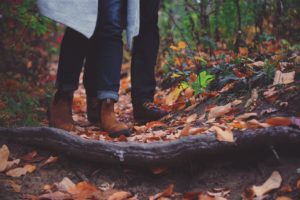
Photo by Takahiro Sakamoto on Unsplash
That’s all. Taking walks. She posts pictures of the lochs, a stream, the bog and the mountain. There are pictures of her dogs, and I imagined wet, muddy paws and soft black and white coats tangled with leaves and stems. I think these posts are among the most joyful and powerful things I’ve ever read, not because Dr. Blackie is an extraordinary scholar and writer, which she is, but because she writes as a woman who’s come home to the place she belongs after a long time away. Her delight and reverence for the land and the life it supports radiate from every word and picture.
That’s how I feel this week, but my homecoming is internal rather than external.
I’m familiar with some of my terrain. Over the years, I’ve learned some of what I am. Always, though, there have been caverns, edges and deep forest I haven’t explored. Perhaps I knew all of myself before my memory in this lifetime begins, but if so, I’ve forgotten.
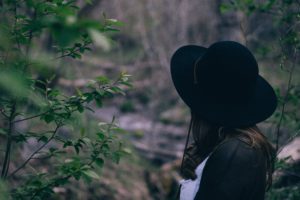
Photo by Cameron Kirby on Unsplash
This week I’m a wanderer, an explorer, a solitary traveler in my own psyche. I leave my well-worn internal paths to roam under trees. I follow the sound of water. I read my own spoor and run my hands over moss-covered rocks. I hunt in vernal pools for singing frogs the size of my toes. I wade through bogs of memory, getting my feet muddy and losing my shoes.
I’ve found old, abandoned structures smelling of rot and damp where birds nest and bats cluster. I’ve stumbled upon shallow graves where, once upon a time, I discarded and abandoned parts of myself. I’ve tripped over fallen idols, are now covered in a lacy blanket of ferns, found forgotten altars and pulled mats of dead leaves out of fountains I haven’t seen in years so clear water can flow again.
I’ve found shed skins whispering and rustling with memory, nearly invisible overgrown paths, and ruts and scars from old burns, floods and landslides.
I suddenly remember the happy feeling of waking early in the morning and going straight outside. I release myself from the expectation that I’ll work well in the last third of the day, a thing I’ve never in my life been able to pull off. I listen to music I love. I read what interests and moves me. I write lists and journal entries, blog posts and edits for my book.
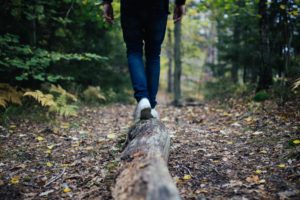
Photo by Jon Flobrant on Unsplash
Like Dr. Blackie’s dogs, I follow what catches my attention. I move along scent trails, noting the passage of all my selves, spiraling from what I’ve been to what I’ll become and back again. I dance from thought to thought, from word to word, from dream to dream. I cast myself into a wider pattern of life.
It’s not that I don’t want to do anything. On the contrary, I want to do a hundred things. I want to do much more than I did when I was structuring my time and energy around my job. I can hardly wait to get out of bed and see what the day brings. I want to play outside, take care of tasks inside, read, write, watch the birds at the feeders, stretch, dance, swim, listen to music, make a list and check things off, be present in my relationships, make new friends, pursue intriguing new connections, earn money joyfully, and see how much I can want and how gloriously I can dream.
I’ve written about leaving home before, and in that post I wrote that in some counterintuitive way leaving my old external home in Colorado allowed me to begin to finally come home to myself internally and reclaim my power. I’ll never think of home solely as a one-dimensional place in the world again. Home is not just a house, not just a beloved landscape, but the place where my dearest friend, my most passionate lover and my most loyal companion reside, along with my deepest power. Home is my own wide-flung arms, my own pulse and breath, my own joy. Home is me, myself.
Somewhere along the way, we forgot that the most important things are also the simplest. There’s great power in being happy. If happy is missing, life is muted and apathetic at best. This is when the power of boredom and the power to quit come to our aid. This is when choice becomes something we must fight to reclaim as if our lives depend on it … because they do.
Claiming the power of happy. My daily crime.

Photo by Senjuti Kundu on Unsplash
All content on this site ©2017
Jennifer Rose
except where otherwise noted














